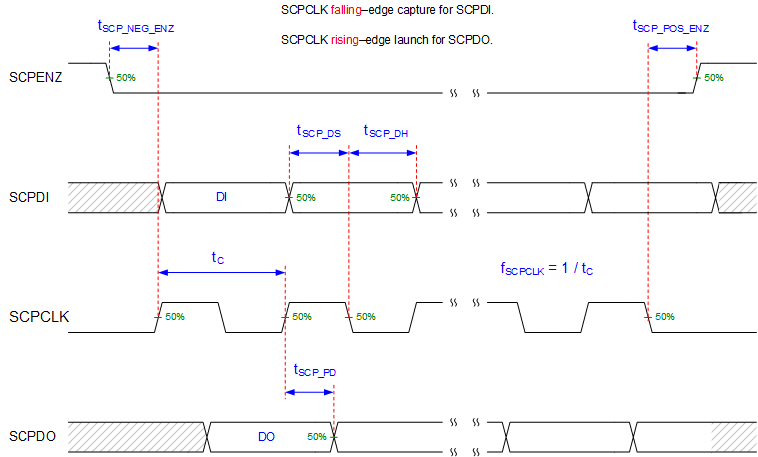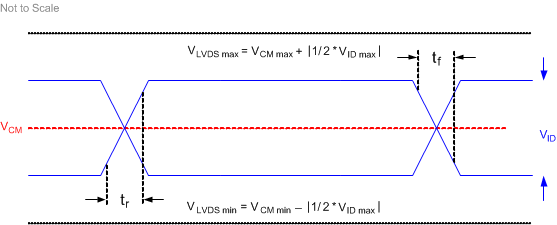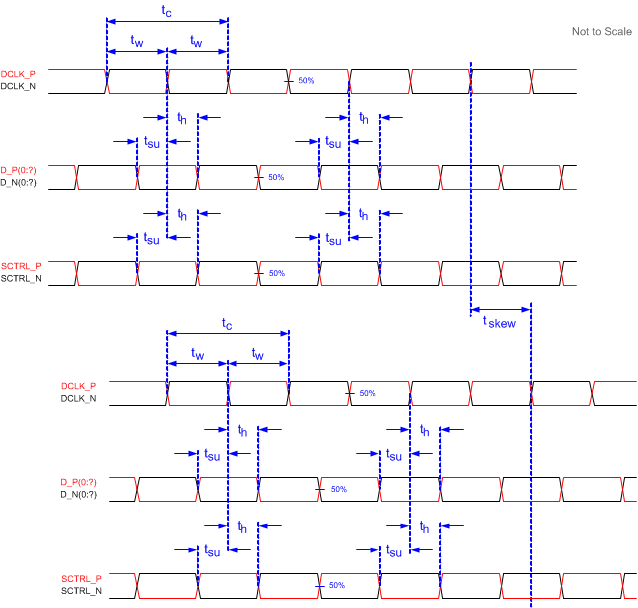ZHCSTJ0 October 2023 DLP651LE
PRODUCTION DATA
- 1
- 1 特性
- 2 应用
- 3 说明
- 4 Revision History
- 5 Pin Configuration and Functions
-
6 Specifications
- 6.1 Absolute Maximum Ratings
- 6.2 Storage Conditions
- 6.3 ESD Ratings
- 6.4 Recommended Operating Conditions
- 6.5 Thermal Information
- 6.6 Electrical Characteristics
- 6.7 Timing Requirements
- 6.8 System Mounting Interface Loads
- 6.9 Micromirror Array Physical Characteristics
- 6.10 Micromirror Array Optical Characteristics
- 6.11 Window Characteristics
- 6.12 Chipset Component Usage Specification
-
7 Detailed Description
- 7.1 Overview
- 7.2 Functional Block Diagram
- 7.3 Feature Description
- 7.4 Optical Interface and System Image Quality Considerations
- 7.5 Micromirror Array Temperature Calculation
- 7.6 Micromirror Power Density Calculation
- 7.7 Window Aperture Illumination Overfill Calculation
- 7.8 Micromirror Landed-On/Landed-Off Duty Cycle
- 8 Application and Implementation
- 9 Layout
- 10Power Supply Recommendations
- 11Device and Documentation Support
- 12Mechanical, Packaging, and Orderable Information
6.7 Timing Requirements
| PARAMETER DESCRIPTION | SIGNAL | MIN | TYP | MAX | UNIT | |
|---|---|---|---|---|---|---|
| LVDS(1) | ||||||
| tC | Clock cycle duration for DCLK_A | LVDS | 3.03 | ns | ||
| tC | Clock cycle duration for DCLK_B | LVDS | 3.03 | ns | ||
| tW | Pulse duration for DCLK_A | LVDS | 1.36 | 1.52 | ns | |
| tW | Pulse duration for DCLK_B | LVDS | 1.36 | 1.52 | ns | |
| tSU | Setup time for D_A(15:0) before DCLK_A | LVDS | 0.35 | ns | ||
| tSU | Setup time for D_A(15:0) before DCLK_B | LVDS | 0.35 | ns | ||
| tSU | Setup time for SCTRL_A before DCLK_A | LVDS | 0.35 | ns | ||
| tSU | Setup time for SCTRL_B before DCLK_B | LVDS | 0.35 | ns | ||
| tH | Hold time for D_A(15:0) after DCLK_A | LVDS | 0.35 | ns | ||
| tH | Hold time for D_B(15:0) after DCLK_B | LVDS | 0.35 | ns | ||
| tH | Hold time for SCTRL_A after DCLK_A | LVDS | 0.35 | ns | ||
| tH | Hold time for SCTRL_B after DCLK_B | LVDS | 0.35 | ns | ||
| tSKEW | Channel B relative to Channel A(2)(3) | LVDS | –1.51 | 1.51 | ns | |
 Figure 6-3 SCP
Timing Requirements
Figure 6-3 SCP
Timing RequirementsSee Recommended Operating Conditions for fSCPCLK, tSCP_DS, tSCP_DH, and tSCP_PD specifications.
See Recommended Operating Conditions for tr and tf specifications and conditions.

 Figure 6-5 Test Load
Circuit for Output Propagation Measurement
Figure 6-5 Test Load
Circuit for Output Propagation MeasurementFor output timing analysis, the tester pin electronics and its transmission line effects must be taken into account. System designers should use IBIS or other simulation tools to correlate the timing reference load to a system environment. See Test Load Circuit for Output Propagation Measurement.
 Figure 6-6 LVDS
Waveform Requirements
Figure 6-6 LVDS
Waveform RequirementsSee Recommended Operating Conditions for VCM, VID, and VLVDS specifications and conditions.
 Figure 6-7 Timing
Requirements
Figure 6-7 Timing
RequirementsSee Timing Requirements for timing requirements and LVDS pairs per channel (bus) defining D_P(0:x) and D_N(0:x).